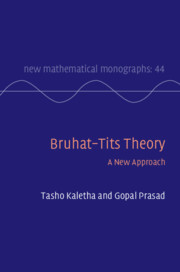Book contents
- Frontmatter
- Dedication
- Contents
- Illustrations
- Tables
- Introduction
- Part One Background and Review
- Part Two Bruhat–Tits Theory
- 3 Examples: Quasi-split Simple Groups of Rank 1
- 4 Overview and Summary of Bruhat–Tits Theory
- 5 Bruhat, Cartan, and Iwasawa Decompositions
- 6 The Apartment
- 7 The Bruhat–Tits Building for a Valuation of the Root Datum
- 8 Integral Models
- 9 Unramified Descent
- Part Three Additional Developments
- Part Four Applications
- Part Five Appendices
- References
- Index of Symbols
- General Index
9 - Unramified Descent
from Part Two - Bruhat–Tits Theory
Published online by Cambridge University Press: 16 May 2023
- Frontmatter
- Dedication
- Contents
- Illustrations
- Tables
- Introduction
- Part One Background and Review
- Part Two Bruhat–Tits Theory
- 3 Examples: Quasi-split Simple Groups of Rank 1
- 4 Overview and Summary of Bruhat–Tits Theory
- 5 Bruhat, Cartan, and Iwasawa Decompositions
- 6 The Apartment
- 7 The Bruhat–Tits Building for a Valuation of the Root Datum
- 8 Integral Models
- 9 Unramified Descent
- Part Three Additional Developments
- Part Four Applications
- Part Five Appendices
- References
- Index of Symbols
- General Index
Summary
Builds on the fact that for any connected reductive $k$-group $G$, the base change $G_K$ is quasi-split, and hence the Bruhat--Tits building and corresponding integral models for $G_K$ have already been constructed. From these, the arguments of the present chapter produce the Bruhat--Tits building and integral models for $G$. While the case of integral models is essentially trivial, as mentioned in the preceding paragraph, the case of the building itself and its properties is far from trivial, and is the main focus of the chapter. The remainder of this chapter establishes further properties, including the existence of a canonical equipollence class of valuations of the root datum of $G$ relative to maximal split torus $S$, the relationship between the building of $G$ and that of a Levi subgroup of $G$, the relationship between concave function groups for $G(k)$ and those for $G(K)$, the important properties of $G$ being \emph{residually quasi-split} or \emph{residually split} are studied in \S\ref{unr:resqs}. Finally, \S\ref{sec:unr_weil} studies the relationship between the building and the parahoric groups for a group and its Weil-restriction of scalars.
- Type
- Chapter
- Information
- Bruhat–Tits TheoryA New Approach, pp. 323 - 386Publisher: Cambridge University PressPrint publication year: 2023

